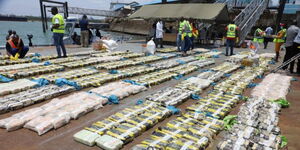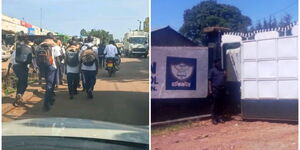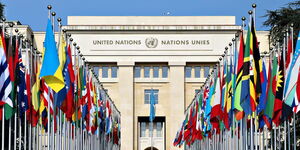As the global energy crisis continues, Kenyans have resulted into making briquettes as an affordable and sustainable alternative source of fuel, resulting in a fortune from the business.
The briquettes, made from human waste, domestic waste, and soil are quickly being embraced for use in households as an alternative to gas, kerosene, firewood, and electricity.
The unpleasant mixture that is used to produce the briquettes makes it seem unlikely that the product can be used as a source for heating homes and cooking meals, but that is far off the mark.
Many users have attested that it does not produce any smell or as much smoke as charcoal or firewood.
“People used to think that it is smelling a lot but that wasn't the case because we used to treat the poop very well to make the product and people would even use it for barbecue," Paul Mansa stated in a past interview with Africa News.
The raw material is treated through heating at high temperatures to kill the bacteria and then it is mixed with sawdust to make the briquettes.
“Also, it has another advantage that it is not affecting our employees in the canteen medical-wise because the smoke affects the health of the employees but with briquettes, we do not have those chances at the moment, ” Paul Manda, a factory manager at a briquette making factory, speaking to Africa News at a past interview stated.
Locally made briquettes are either carbonized charcoal briquettes or sawdust briquettes and are a good alternative to charcoal and wood as they are derived from waste material.
Sawdust briquettes are made from a combination of maize cobs, maize stalks, waste vegetable matter, and charcoal dust.
Briquettes are a cost-effective alternative energy source, selling for up to Ksh450 for five kilograms, an amount that can be used over a period of four weeks.
David Nderitu and Lillian Njeri, a couple, during a past interview with standard spoke of their venture into briquette production, stating that their journey in the business began as a solution to expensive cooking fuel.
"We were shocked to learn that families were having trouble putting food on the table because there wasn't enough readily available cooking fuel. Children would pursue cows to collect their dung, dry it, and then use it,” the couple stated.
Njeri recalled that at the time when firewood cost Ksh100 and a tin of ordinary charcoal sold for Ksh80, they sold briquettes at Ksh30.
Briquette-making venture is quickly growing with the Kenyan Government now putting up production stations to offer affordable fuel alternatives.
Speaking on Sunday, January 8, Kilifi governor Gideon Mung’aro stated that the World Bank had funded the government to put up a sewage recycling plant worth Ksh800 million in Malindi that would provide free charcoal to Kenyans.
The sewage recycling plant was meant to transform sludge into briquettes that would be more accessible to the public and protect the environment.
“We will use all the domestic waste from your homes to make charcoal that you will have access to so that you can stop cutting down trees,” Mung’aro stated












